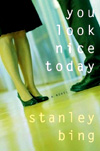
Comment
on this story
|
 |

Bing tells recognizable tales of the modern workplace
by by Jonathan B. Frey
The Fiction of Business is an unheralded yet persistently American literary form. Varieties of novelistic genre are diverse, encompassing science, horror, history, spies, romance, etc., but even in the longer list of genres one infrequently awarded mention is the FOB, those novels staged in the corporate office, amid unabashed pursuit of lucre and ruthless subjugation of the individual to commercial interests. As described in Stanley Bing's funny yet tragic new novel, You Look Nice Today (Bloomsbury, $25): "Business environments are all about order, about the leaching out of personal material, the pursuit of emotionless objectives, the pleasure of operating in a known universe." Hardly rich fodder to the novelist, other than as the butt of throwaway lines or as reference to Sisyphus' eternal stone rolling.

Nevertheless, the FOB endures, most notably among American authors, commencing from Melville's 19th century archetype slacker tale Bartleby the Scrivener, through early 20th century Dreiser's Darwinism and Sinclair's muckraking, to Sloan Wilson's '50s FOB classic The Man in The Gray Flannel Suit, and finally the contemporary offerings of Lightman, Kirn, and Bing, among others. Over 150 years ago, de Tocqueville observed, "in the United States, a rich man believes that he owes it to public opinion to devote his leisure to some operation of industry or commerce or to some public duty. He would deem himself disreputable if he used his life only for living." Perhaps it is the same Puritanical urge that drives the American belletristic dedication to such an otherwise unpromising literary form.
You Look Nice Today situates solidly in that FOB tradition. Shed of its lively green dust jacket, it presents as a sober, black volume, complete with an attached green bookmark ribbon, an unusual artifact in novels today but distinctly evoking the businessman's diary. (Truth be told, the diary is as archaic as the typewriter in the digital office; nevertheless, it has the same effect here as when it makes an antiquated appearance in the halls of industry: evidence of playing at executive). The novel's epigraphs are an Equal Employment Opportunity policy ("The company will not tolerate any form of harassment on account of race, color, national original, religion, sex," etc.), and "No good deed goes unpunished." In addition to foreshadowing the plot, these quotations suggest a businesslike blend of procedural officiousness and Machiavellian menace. Moreover, that neither quotation can be sourced to anyone by name—the former attributed to "Corporate EEO Policy" and the latter to "Anonymous"—serves to enforce the facelessness universally associated with the large commercial enterprise, an inscrutable affect that resists individuality.
Guiding this tale of multinational conglomerate life at the end of the last century is the aptly named narrator Fred Tell, executive VP of human resources and, by virtue of his title and the events that unfold, ideal for explicating the ways of corporate etiquette—although Tell is in fact only selectively candid and a bit of a snoop: a listener at keyholes. He introduces the main protagonists, CaroleAnne, initially a temp but in due course a full-time employee ("I believe it would be remiss of me, if not almost criminally disingenuous, either to skip or somehow disguise the striking quality of her physical beauty") and Harb, executive VP of process and procedure ("bland, bland to a level so profound it was almost a personal statement"). True to his role, Tell couches much of what he observes in terms of official expectations: "Keep in mind, please, that large emotions and reactions are alien to a true corporate workplace environment. We seek sameness. A great business milieu is like crème brulee, with the tasty custard down below and a fine glazed topping above, sweet and hard, that obscures what is beneath. CaroleAnne violated that crust immediately. She was all custard." Given these essential elements (personnel harassment policy, VP of HR, bland male executive and custard-like female assistant), no further detail is necessary to forecast this novel's arc.
Despite the parable-like inevitability, the strength of You Look Nice lies in its humorous, sometimes brilliantly perceptive, portrayal of business culture: The Nightcap ("conducted with a group of chattering, garrulous wahoos, with Harb at its dead center, the guru, the magnet"), Professional Advancement ("discord and misery on the personal front go hand in hand with professional achievement"), Smokers ("scowled at... condemned to stand outside... crouching against the wind with a ragtag assembly of secretaries, shoeshine men, and addicted executives"), Corporate Missions ("in a flagging environment... squishy, cultural improvement efforts like Quality... become tomorrow's hula hoop"), and Executive Behavior ("executives are rarely happy unless they are either reacting to or creating some crisis or other"). As such, You Look Nice most succeeds as a shrewd chronicle of rituals, an anthropology of professional custom, lacking in narrative surprise but full of insightful entertainment.

January 29, 2003 * Vol. 14, No. 5
© 2004 Metro Pulse
|